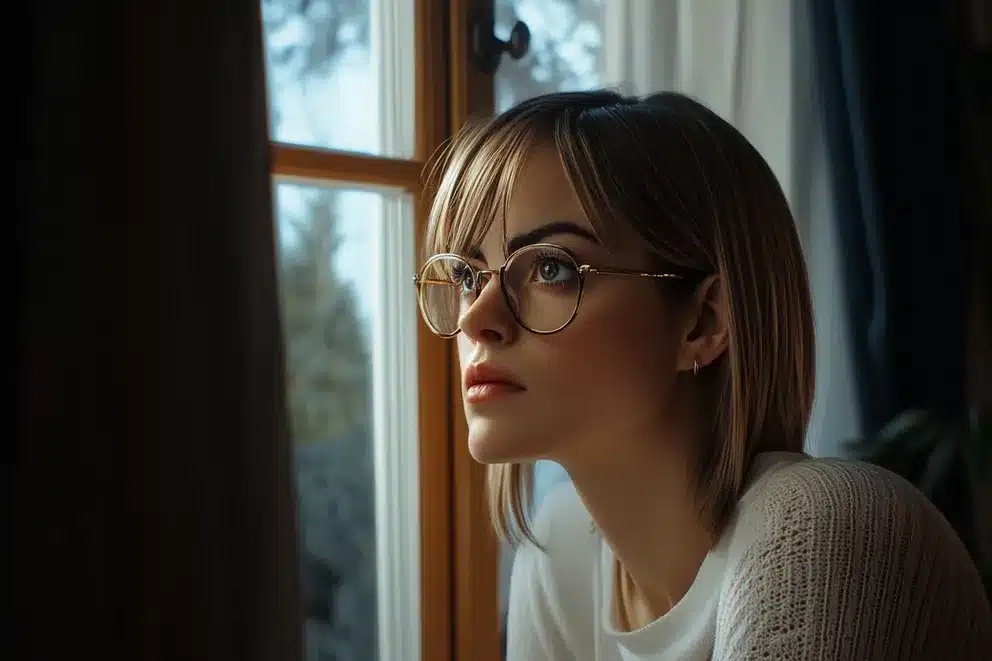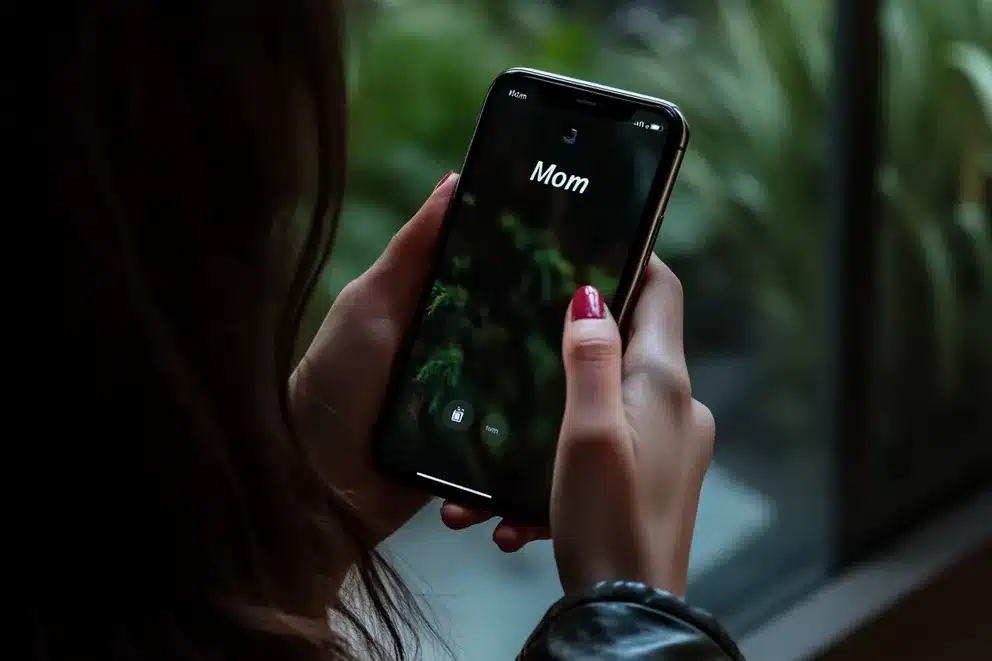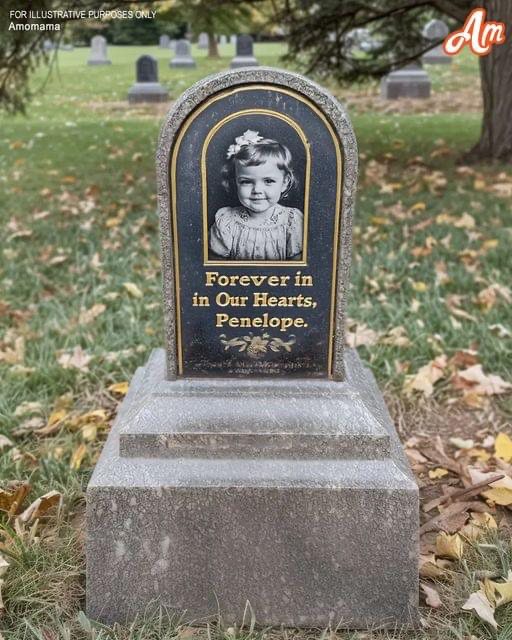Here’s the rewritten version:
I thought visiting Dad’s grave would help me make peace with the past, but when I saw a tombstone nearby with my photo and name, a chill ran down my spine. I never imagined that this eerie discovery would unravel a life-changing truth about my mother.
It’s been two years since I lost my dad to cancer—two years, four days, and a lifetime of heartache.
I still vividly recall the day we learned he had stage IV lung cancer. It felt like the world stopped, and we were trapped in a nightmare we couldn’t wake up from. The doctors began treatment right away, but deep down, we knew it was a losing battle. Dad fought bravely, but in the end, cancer won.
The day he passed, I was at home in the city when Mom called from our hometown. Her voice, usually so strong, cracked as she delivered the news.
“Penny… he’s gone.”

Everything that happened next is a blur—a whirlwind of tears, frantic packing, and the drive to Mom’s house. My husband, Andrew, drove us there, but I kept hoping that Dad would walk out the front door with open arms. He never did.
At the funeral, surrounded by family, I felt disconnected from my body, like I was watching myself weep as they lowered his casket into the ground. It felt like a part of me was buried with him.
They say time heals all wounds, but the pain of losing my father is still fresh. It’s been two years, but it feels like just yesterday I got that dreadful call from Mom.
At first, I couldn’t function. Every night, I cried myself to sleep, replaying memories of Dad—the time he taught me to ride a bike, the way he’d sneak me extra ice cream, his proud smile at my college graduation. The pain was overwhelming, and I started questioning everything. Why did this happen to us?
I couldn’t bear to visit our hometown anymore; every street and familiar face reminded me of Dad. So, I buried myself in work, hoping to drown out the grief. Mom began visiting me instead, which I was grateful for, but recently, guilt started to gnaw at me. I knew I had to go back and face the memories I’d been avoiding.
Last week, Andrew and I finally made the drive home. Anxiety twisted my stomach as familiar landmarks came into view, but I knew I had to do this—for Dad, for Mom, and for myself.

We stopped at the cemetery first, and each step toward Dad’s grave felt heavier than the last. When I finally reached it, my knees gave out. I sat there, tracing his name on the cold stone, tears streaming down my face.
“I miss you so much, Dad,” I whispered, wishing for one last embrace.
I lost track of time, lost in memories and regrets, until Andrew’s gentle touch brought me back to reality.
“Penny,” he said softly, “look over there.”
I followed his gaze, and my heart stopped. A few yards away was another headstone, and on it was… my name.
“Forever in Our Hearts, Penelope,” it read, alongside a photo of me as a little girl, grinning as if I had the world figured out.
“What the heck?” I gasped, staring at the headstone in disbelief. My grave was real. My hands trembling, I pulled out my phone and called Mom.
She answered on the first ring.
“Mom,” I began, “I’m at the cemetery, and there’s a grave with my name on it. What’s going on?”
There was a pause before Mom’s voice, eerily calm, came through.
“I didn’t think you’d ever come back to see it,” she said.
“What do you mean?”
“After your father passed,” she explained, her voice quivering slightly, “I felt like I’d lost both of you. You stopped visiting, stopped calling… I needed something to mourn.”
She paused.
“So, I bought the plot next to your father’s and had the headstone made,” she continued. “It was the only way I could cope.”
How could she do that? I thought. I couldn’t believe my mother had been mourning me, even though I was alive and well. At that moment, I didn’t know whether to feel angry or heartbroken.
But as I thought more about it, something didn’t add up. Why hadn’t she mentioned this during her visits? Why pretend everything was normal?
Then it clicked—the visits, her constant worry about my health, her insistence that I move back home. She wasn’t just grieving; she was preparing for something else. A chill ran down my spine as I remembered the pills she’d given me for a cold last year. Could she have been trying to…?
I needed answers.
“Mom, I’ll be over soon,” I said and hung up before she could respond.
Andrew looked at me, concern etched on his face.
“Penny, what did she say?” he asked.
“I think she’s lost it, Andrew. We need to go to her house. Now.”
The drive to Mom’s felt surreal, bittersweet. The streets and parks reminded me of Dad, but also that he wasn’t here anymore.
As we pulled into the driveway, I almost forgot why we were there—until I saw Mom at the doorstep.
“Hi, sweetheart!” she greeted me with a smile as I got out of the car. “How are you?”
Her cheerful tone was unsettling, especially when I noticed the strange satisfaction in her eyes, like she’d been expecting us.
We sat in the living room, and everything was as I remembered, except for one addition: a small shrine with my photo, candles, and fresh flowers. My stomach churned.
“Mom, this has to stop,” I said, trying to keep my voice steady. “Why did you do it? Why pretend I was dead?”
She sighed. “I couldn’t let you leave me like your father did. I needed to keep you close, Penny. This was the only way I knew how.”
I felt sick. This wasn’t just grief—it was an obsession. I realized that Mom wouldn’t let me live my life if I let her continue like this. She wanted to control me, trap me in this town, in her house, in the twisted reality she had created.
I knew I had to stop her.
“Mom, this isn’t normal,” I said, standing up. “I think you need to talk to someone, maybe a professional who can help you through this.”
She shook her head.
“Mom, please,” I cried. “I’ll get you the best therapist in town, and you’ll be fine in no time.”
“I’m not going anywhere, Penny,” she said, looking down at her palms. “And neither are you.”
Stay calm, Penny, I told myself, taking a deep breath. Pushing her wouldn’t work.
“Okay… how about this,” I began, hoping she’d consider my suggestion. “Why don’t you come live near us? I’ll find you a nice house nearby, and we can see each other every day.”
Mom looked at me blankly.
“I mean, you won’t have to be alone, and I can look after you. What do you say?”
A warm smile spread across her face. “You’d really do that for me, Penny?”
“Of course, Mom,” I said, taking her hand. “We’re family. But if you agree, I need you to let go of this… memorial you’ve built. It’s not healthy, and it’s not real. Let’s take it down and start fresh, okay?”
She hesitated but eventually nodded. “Alright, Penny. If it means being closer to you, I’ll do it.”
A week later, I stood beside Mom as we watched the cemetery workers carefully remove the headstone with my name on it. And then it was time to dismantle the shrine in the living room.
Soon, we began preparing for Mom to move near us. The transition hasn’t been easy, but I know it’s the right one. I’m so grateful I visited Dad’s grave that day because if I hadn’t, I might never have learned about the strange world Mom was living in.
Now, for the first time in years, it feels like we’re finally moving in the right direction. Dad’s memory will always be with us, but it’s now a source of strength rather than pain.
If you enjoyed this story, you might also like this one: When Abi’s mom is admitted to the hospital with intense pain and a high fever, she is told her mother needs surgery. But before going under, her mom makes a strange request: that Abi go home and burn a notebook. What secrets does the notebook hold, and why is it so important?
This story is inspired by real events but has been fictionalized for creative purposes. Names, characters, and details have been changed to protect privacy and enhance the narrative. Any resemblance to actual persons, living or dead, is purely coincidental and not intended by the author.
The author and publisher make no claims to the accuracy of events or portrayal of characters and are not liable for any misinterpretation. This story is provided “as is,” and any opinions expressed are those of the characters and do not reflect the views of the author or publisher.

